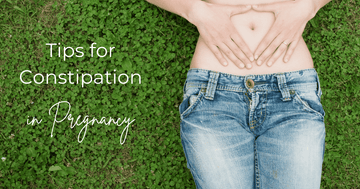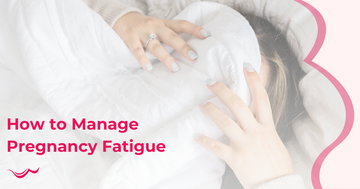Tips for Constipation in Pregnancy
by Nikki Warren on May 02, 2022

Constipation in pregnancy is a common complaint, even from early pregnancy. If you’re struggling with constipation and you feel like you’ve tried everything, don’t despair. With these tips, we can help get you “moving” again 😉
Common problems during pregnancy may include constipation. We may wonder, what causes constipation in pregnancy? Different factors such as pregnancy hormones and dietary fibre including both soluble and insoluble fibre could play roles in severe constipation. This article will discuss ways to relieve pregnancy constipation as well as pregnancy weight gain.
What causes constipation during pregnancy?
An increase in progesterone
Pregnancy constipation may be prevalent from the first trimester. As with many other pregnancy symptoms, pregnancy hormones are the culprit behind constipation.
The increase in progesterone hormone during pregnancy causes the body’s muscles to relax, including your intestines.
As a result, the intestines will also move slowly. Which means the passage of stool through the bowel will take longer than usual. This increases the amount of water the colon absorbs from the stool. Making it more solid and difficult to pass, thus leading to constipation.
As a steroid hormone, progesterone is initially produced by the corpus luteum, which develops after ovulation. Progesterone reaches a peak about 7 days after ovulation and if conception has occurred, it keeps rising throughout pregnancy.
Iron supplements
The recommended amount of iron increases substantially during pregnancy to 27mg daily. This is especially important from about week 16 when haemodilution occurs (a doubling of the blood volume).
Iron is an essential nutrient that helps produce red blood cells. It is crucial that you’re getting enough for yourself and your baby. Pregnant women are prone to constipation, believe it or not. But what might cause your infrequent bowel movements could be the iron supplements you’re taking.
There are several types of iron supplements. However, iron bisglycinate is the easiest for the body to absorb and is usually well tolerated. Other types of iron may cause issues with constipation, mostly ferrous fumarate and ferrous sulfate.
If your stools are darker than usual, that’s a good indication that you’re overdoing it on the iron supplementation. It could also mean you need to see your doctor for other reasons.
Can constipation cause miscarriage?
When you’re carrying a baby, you may worry at the slightest feeling of uneasiness in your body. From having a cold or cough, headache, or constipation, you may fret over how it’s going to affect your baby.
While constipation is one of the common problems during pregnancy, some mama’s are worried that it might cause a miscarriage.
In the same way that having sex during pregnancy doesn’t hurt the baby, neither does straining to have a poo!
Why is fibre essential during pregnancy?
Dietary fibre plays a huge role in achieving healthy wellbeing. Increased consumption of fibre during pregnancy improves gut microbiome diversity, decreases the risk of glucose intolerance and helps to prevent constipation. Along with increasing water intake, this is a first-line therapy for constipation.
Dietary fibre is known as roughage or bulk. Your body does not digest it; instead, it passes through your digestive system without breaking down or being digested.
There are two types of fibre: soluble and insoluble fibre.
Soluble fibre dissolves in water and forms a gel-like substance that helps lower cholesterol levels. It also can help regulate blood sugar levels. It absorbs water to soften your stool and move it smoothly through the digestive tract.
These undigested foods create “bulk” that make stools easier to push out. Oats, flax seeds, beans, brussels sprouts, apples, pears, avocado and carrots are laden with soluble fibre.
Insoluble fibre doesn’t dissolve in water. This helps move food through the stomach and intestines and adds bulk to the stool. It attracts water into your stool, making it softer and easier to pass with less strain on your bowel.
Insoluble fibre, like soluble fibre, may help reduce your risk for diabetes. This is by slowing down the absorption of sugar, improving blood sugar levels. You can find insoluble fibre in brown rice, green beans, nuts, cauliflower, potatoes and wheat.
Most plants contain both soluble and insoluble fibre but in different amounts. One indication that you’re getting enough dietary fibre is if your stools are large and soft and you aren’t straining to pass them.
Tips for increasing dietary fibre
Women should aim to eat 25 grams of dietary fibre per day with 6-8 grams coming from soluble fibre.
An easy way of getting both soluble and insoluble fibre is to eat oats for breakfast (which is also great for the nervous system) or All Bran. Just half a cup contains a whooping 1.5 grams of soluble fibre and 11.1 grams of insoluble fibre! Try topping with some banana or apricots and some yoghurt for probiotics. Be aware though that All Bran (like most cereals) is high in sugar so this is just a short term solution.
Then try brown rice for lunch or dinner – one serving contains 7.8 grams of fibre. You could try brown rice salads or stir fry’s loaded with veggies to really boost your nutrient intake as well as fibre intake.
Besides regulating bowel movements and preventing constipation in pregnant women, foods rich in fibre have many other benefits during pregnancy.
- It helps maintain blood sugar levels at a reasonable level.
- Soluble fibre reduces cholesterol levels. Therefore, it reduces cardiovascular disease risks.
- It helps to keep pregnancy weight gain under control.
Top 10 Tips to Cope with Constipation in Pregnancy
Aside from increasing dietary fibre, here are some other ways to relieve pregnancy constipation:
Stay hydrated
The average pregnant woman should aim to drink 2-3 litres of filtered water a day. This will help keep your bowels soft and moving smoothly through your digestive tract.
Exercise more
Exercise is known for helping to keep your bowels moving regularly. Simply add more movement to your day, like walking around the neighbourhood. Exercises that increase your heart rate and move your body are good for your overall health during and after pregnancy.
Increase magnesium intake
Magnesium citrate doesn’t have the laxative effect that magnesium oxide has. However, it can help to loosen the bowels in high doses. 2 teaspoons of Calcium & Magnesium Plus K2 & D3 taken after dinner, provides a whopping dose of 500mg of magnesium citrate. This should help to produce a bowel movement in the morning.
Try Benefiber
This tasteless wheat dextrin product contains 3 grams of soluble fibre per 2 teaspoons and is easy to mix in with your Calcium & Magnesium powder at night. Try mixing 2 teaspoons of Benefiber with 2 teaspoons of Cal-Mag powder.
Drink Yakult
Drinking one bottle of Yakult daily not only helps boost your immune system, it was also found to improve stool consistency in this study. I always recommend taking probiotics after dinner as your body goes into repair mode at night.
Take Probiotics
There are several probiotic strains that have been clinically trialled and found to reduce constipation, in particular strains of lactobacillus casei, lactobacillus plantarum and bifidobacterium animalis.
Increase Vitamin C intake
Vitamin C is known to have a laxative effect at high doses which is why the recommended limit during pregnancy is 2000mg in a day. You could try this dose when you feel a cold coming on or if you’re constipated (take 1000mg twice daily).
Eat kiwifruit
Eating two kiwifruit daily has been found to increase colon transit time and reduce constipation. Try eating them at night for dessert.
LSA
LSA stands for linseed, sunflower seeds and almonds and is a mix you can find in health stores or supermarkets. Sprinkle 1 to 2 tablespoons on your oats for breakfast or mix with yoghurt and a very ripe banana for dessert (ripe bananas are a great source of soluble fibre). Flax seed meal is a bulking agent, resulting in soft, slippery, well-formed stools that are easier to pass. This mix also has the added benefit of boosting your omega-3 intake!
Try glycerol suppositories for severe constipation
Sometimes our bowels can be incredibly stubborn and the above measures aren’t successful. If this is you and it has been days since your last bowel movement or you are feeling incredibly uncomfortable and nauseous as a result of your constipation, you may wish to speak to your pharmacist about glycerol suppositories. Please note that these must NOT be used in the first trimester. You can purchase these from your local pharmacy.
Having constipation can be unpleasant and physically uncomfortable, but it's easy to fix with some natural remedies.




